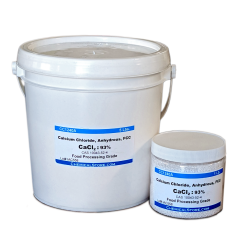Inorganic Salts
In chemistry, a salt is a compound composed of an ionic arrangement of positively charged cations and negatively charged anions, resulting in a compound with no net charge. A common example is table salt, which contains positively charged sodium ions and negatively charged chloride ions.

AS1627
Technical-grade aluminum sulfate for water treatment and industrial uses.
options
From $0.52 /lb

KALUM
High-purity potassium alum for water purification and various applications.
options
From $4.50 /lb

PN1439P
High-purity potassium nitrate, 99.8%, available in prills or crystals.
options
From $6.25 /lb

PST3921
Piezoelectric compound for protein crystallography & Fehling's solution ingredient
options
From $0.08 /gr

PS1B39
Potassium sorbate, food-grade preservative, prevents mold, yeast, and microbes.
options
From $13.50 /lb

SC1241
Natural sun-dried crystals for food, water purification, and crystal growth.
options
From $10 /lb

SPC2010
Granular sodium percarbonate, >85%, powerful cleaner and bleaching agent.
options
From $8.50 /lb

SS1523A
Oxygen scavenger and reducing agent for water, textiles, and photography
options
From $1.90 /lb
Sodium Tripolyphosphate, Food grade, Kosher
Versatile detergent component and food preservative.
Aluminum Sulfate
Technical-grade aluminum sulfate for water treatment and industrial uses.
Ammonium Nitrate, 99%*
High-nitrogen fertilizer and pyrotechnic ingredient.
Calcium Carbonate, Fine Ground Limestone, Fcc
Calcium Carbonate, Fine Ground Limestone
Calcium Chloride, Anhydrous, 93%+, FCC
Food-grade compound for freezing, food processing, and de-icing.
Copper Sulfate, Pentahydrate, 99.9%
High-purity grade copper sulfate for industrial and agricultural use.
Liquid Sodium Silicate (Water Glass)
Multi-purpose liquid with adhesive, sealing, and bonding applications.
Magnesium Carbonate, Basic, USP, "Extra Light"
Extra light magnesium carbonate, USP/FCC grade, food/pharmaceutical use.
Potassium Alum, FCC
High-purity potassium alum for water purification and various applications.
Potassium Carbonate, 99.5%, FCC
Highly pure, versatile compound for industrial and lab use.
Potassium Ferricyanide 99.5%
High purity chemical for industrial and laboratory use.
Potassium Ferrocyanide, 99.3%
High purity iron cyanide salt for industrial use.
Potassium Nitrate
High-purity potassium nitrate, 99.8%, available in prills or crystals.
Potassium Permanganate, Free Flow
Potassium permanganate, 97% purity, strong oxidizer, technical grade
Potassium Sodium Tartrate, Tetrahydrate,
Piezoelectric compound for protein crystallography & Fehling's solution ingredient
Potassium Sorbate, FCC, Kosher
Potassium sorbate, food-grade preservative, prevents mold, yeast, and microbes.
Prussian Blue Pigment
Non-toxic, vivid blue pigment for art and industrial uses
Sodium Carbonate, Soda Ash (Naco3)
Alkaline compound for detergents, water softening, and pH adjustment.
Sodium Chloride 99.6% (Salt Crystal, Solar Salt)
Natural sun-dried crystals for food, water purification, and crystal growth.
Sodium Chlorite, 80% Technical
Technical-grade Sodium Chlorite for chlorine dioxide generation.
Sodium Gluconate, Fcc, 99.9%
Non-toxic, biodegradable chelating agent for industrial and food applications.
Sodium Hexametaphosphate (Shmp)
Water softener, detergent, and dispersing agent.
Sodium Lauryl Sulfoacetate (SLSA), Coarse Powder
Organic surfactant with excellent foaming and emulsifying properties.
Sodium Metabisulfite, 98%
Food-grade fine crystal used as a preservative and antioxidant.
Sodium Perborate Tetrahydrate, Min 96%
Powerful oxygen bleach for laundry and cleaning.
Sodium Percarbonate > 85%
Granular sodium percarbonate, >85%, powerful cleaner and bleaching agent.
Sodium Silicate Powder, High Alkaline
High alkaline sodium silicate powder, SiO₂/Na₂O ratio 2, pH 11.5.
Sodium Silicate, Powder, Low alkaline
Low alkaline sodium silicate powder, SiO₂/Na₂O ratio 3.22.
Sodium Sulfite, Anhydrous, 98%
Oxygen scavenger and reducing agent for water, textiles, and photography
Sodium Tetra Borate, Decahydrate (Borax)
99.9% technical-grade borax, white powder or granules.
Sodium Thiosulfate, Pentahydrate, Crystals
High-purity sodium thiosulfate crystals for industrial applications.
Sodium Tripolyphosphate (STPP), Powder, Food Grade, Kosher
Food-grade water softener, emulsifier, and preservative for food.
Trisodium Phosphate (Tsp), Technical
White crystalline cleaner, degreaser, and industrial-grade additive.
Zinc Stearate, Super Fine
High-stability powder for mold release, lubrication, and more.
- 1

 Pigments & Dyes
Pigments & Dyes Metals
Metals Aluminum - Powder
Aluminum - Powder Bronze - Powders
Bronze - Powders Copper - Powders
Copper - Powders Iron Metal - Powders
Iron Metal - Powders Magnesium
Magnesium Metal Electrodes
Metal Electrodes Tin Metal - Powders
Tin Metal - Powders Zinc Metal - Powders
Zinc Metal - Powders Lab Supplies
Lab Supplies Clamps and Supports
Clamps and Supports Glassware
Glassware Handling
Handling Magnifiers
Magnifiers pH Indicators
pH Indicators Plasticware
Plasticware Rubber Stoppers
Rubber Stoppers Rubber tubing
Rubber tubing Steelware
Steelware Test Tubes
Test Tubes Tools
Tools Caliper
Caliper Counter
Counter Hygrometer
Hygrometer Scales
Scales Thermometers
Thermometers Electricity
Electricity Electrodes
Electrodes Multimeters
Multimeters Wires
Wires

























